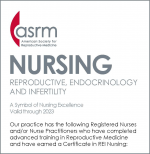
Men's Health Month: Boosting Male Fertility
What is male infertility? When people think about infertility, many put the blame on the female partner. Few realize that a man’s fertility can play just as large of a role. Fortunately, there are many things you can start doing today to aid in boosting male fertility. Boosting your sperm count A… Continue Reading

Helping You Achieve a Healthy Pregnancy
Discovering that you’re pregnant is truly life changing. Whether trying to conceive, or already pregnant, there are many changes and precautions that are necessary to achieve a healthy pregnancy. The team members at the Center for Reproductive Medicine want you to know that they are committed to helping you… Continue Reading

World Immunization Week: The Importance of Immunizations
This year, World Immunization Week started April 24th. This reminds us to revisit the importance of immunizations for women before, during, and after pregnancy. If you are pregnant or planning for pregnancy, you will need certain vaccinations, which will depend on your age, lifestyle, types of travel, travel… Continue Reading

National Infertility Awareness Week: We’re Here for You
April 24-30 is National Infertility Awareness Week, a time of the year that is very important to our team at the Center for Reproductive Medicine. During this significant week, we’re reminded that infertility can be a difficult and life changing time for people who want to conceive. We want to remind you th… Continue Reading

Common Misconceptions About Fertility
Infertility is defined as the inability to conceive a child despite attempting to conceive for at least a year. If you and your partner are suffering with fertility issues, you’re not alone. With more than five million cases in the United States every year, infertility affects more people than you might thi… Continue Reading

National Endometriosis Awareness Month: Does Endometriosis Affect Your Fertility?
What is endometriosis? Endometriosis is a disorder that affects the tissues that line the uterus (the endometrium). When endometriosis occurs, the endometrial tissue grows outside of the uterus. It can grow into the ovaries, bowel and tissues lining of the pelvis, which can cause severe pain and discomfort… Continue Reading

Zika Virus: What You Need to Know
What is the Zika virus? The Zika virus is a virus that can be spread by a certain breed of mosquitoes, called Aedes aegypti, found throughout North, Central, and South America. When a pregnant woman becomes infected with the virus, it can lead to the development of microcephaly in the unborn child. Microce… Continue Reading

Polycystic Ovary Syndrome and Fertility
What is polycystic ovary syndrome (PCOS)? Polycystic ovary syndrome (PCOS) affects more than three million women of reproductive age every year. PCOS is characterized by enlarged ovaries that contain small collections of fluid-filled follicles or cysts in each ovary. Women with PCOS are more likely to hav… Continue Reading

Factors That Affect Fertility
Most people know that our fertility decreases as we get older. But there are many other factors to consider, as well. If you’re planning for a family in the future, it’s important to understand your fertility, the factors that affect it, and what you can do to increase your chances of conceiving. Facto… Continue Reading

Understanding Fertility Medication
If you have been struggling to conceive, fertility medications and treatments can increase your chances of conception. Fertility medications are typically the first treatment option for women with ovulation disorders. These medications can be administered orally or injected. Fertility medications aid in re… Continue Reading

Are You a Candidate for IVF?
What is IVF? IVF (in vitro fertilization) is one of the most effective forms of assisted reproductive technology used to treat fertility or genetic problems and to assist with conception. IVF is performed when mature eggs are retrieved from the ovaries and fertilized by sperm in a lab, creating an embryo.… Continue Reading

Is Egg Freezing for You?
What is egg freezing? Egg freezing, also referred to as mature oocyte cryopreservation, is an approach used to preserve a woman’s reproductive future. To freeze a female’s eggs, the unfertilized eggs are first collected from the ovaries, then frozen and reserved for later use. When a woman is ready to… Continue Reading


